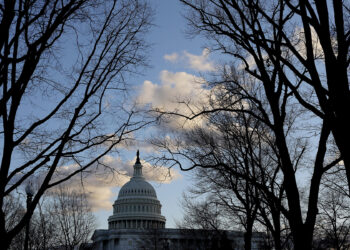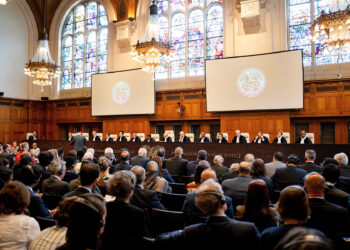Congress Can Push Back Against Authoritarianism and Fossil Fuel Dependence in Response to OPEC+ Decision
Thirteen organizations from the human rights, progressive, and environmental communities sent a letter to Senate Majority Leader Chuck Schumer and House Speaker Nancy Pelosi calling on Congress to prioritize climate and human rights concerns in recalibrating the U.S.-Saudi Arabia relationship. At the latest OPEC+ meeting, the Saudi government decided to drive up global oil prices, driven by interests shared between dictators who rely on fossil fuels. In response, Congress has an opportunity to push back on both authoritarianism and the predominance of fossil fuels, and to work toward a world where the U.S. can be a leader in a just transition to renewable energy.
The full text of the letter can be read below.
November 14, 2022
The Honorable Nancy Pelosi Speaker of the House
U.S. House of Representatives Washington, DC 20515
The Honorable Chuck Schumer Majority Leader
United States Senate Washington, DC 20510
Dear Speaker Pelosi and Majority Leader Schumer,
We, the undersigned organizations, urge you to take up legislation re-calibrating the U.S.-Saudi relationship in the post-election session. As the recent OPEC+ decision to cut oil production by 2 million barrels per day underscored, the Saudi government under Crown Prince Mohammed bin Salman is aligning with like-minded fossil fuel-exporting authoritarians who commit gross human rights violations at home and abroad, launch destabilizing military interventions, and export digital repression and kleptocracy outside their borders. Congress must reset the fundamentals of the U.S.-Saudi relationship by rolling back military support to the Saudi government, protecting Saudi dissidents, and accelerating a renewable-energy transition that will make the U.S. and global economy less dependent on both climate crisis-inducing fossil fuels and the political whims of oil-rich despots.
It is unsurprising that the Saudi and Russian governments share an interest in raising energy prices at this time. Both governments pour profits from their fossil fuel exports into repressing basic human rights and committing war crimes. Both use their leverage over energy markets to undermine international peace – the Russian government, to execute their illegal invasion of Ukraine and blackmail European countries over their support for Ukraine's democracy; the Saudi government, to sell a narrative of regional indispensability, even as it enforces a de facto blockade of Yemen's key ports, dismembers a journalist, and kidnaps another country's prime minister. This leverage stems from vast oil and natural gas reserves that, as they are consumed, steadily make our planet uninhabitable. And the benefits of oil price hikes extend to other rights-repressing OPEC+ governments, who need the world hooked on oil to stabilize their authoritarian rule.
The United States cannot allow petro-dictator leverage over energy markets to set the course of international politics. By seizing this opportunity to de-securitize the U.S.-Saudi relationship and accelerate a renewable energy transition, Congress would simultaneously make progress on climate action, the defense of human rights, and the fight against rising authoritarianism.
Stopping the unfettered flow of weapons and other forms of security cooperation while supporting accountability for rights abuses would undercut Saudi Arabia's ability to commit further war crimes in Yemen and provide critical leverage to protect Saudi human rights defenders. It would also weaken the petro-dictatorship coalition, sending a clear signal to the international market that the U.S. government no longer labors under the false belief that its interests and those of authoritarian fossil fuel producers and profiteers are the same.
De-securitizing U.S.-Saudi relations will create opportunities to reorient U.S. foreign policy toward climate action and climate justice, but the effort to curb the leverage of Saudi Arabia and other petro-dictators will fail without a parallel effort to transform energy markets, so that oil companies seeking record profits no longer reinforce those governments' reckless political decisions. That starts with laws to disincentivize fossil fuel companies from fleecing households and using taxpayer dollars to worsen the climate crisis. It must continue with robust congressional oversight to secure speedy and equitable implementation of the Inflation Reduction Act's green energy provisions, further funding for the expansive use of the Defense Production Act to ramp up renewable energy, and revisiting bold, transformational legislation such as the Green New Deal in the 118th Congress.
In the current Congress, members have introduced legislation that de-securitizes the U.S.-Saudi relationship, protects Saudi human rights defenders, and speeds the renewable-energy transition, opening up multiple pathways to recalibrating U.S.-Saudi ties. And while not all the undersigned organizations endorse every piece of legislation listed below, we each urge you to facilitate the passage of, or bring up for debate, some combination of the following:
On arms sales and military support:
H.R. 9181 and S. 5704 – one-year halt to direct commercial and foreign military sales;
H.J.Res. 87 (with 117 cosponsors) and S.J.Res. 56 – the Yemen War Powers Resolution;
H.R. 9168 – the Strained Partnership Act; and
H.J.Res. 63 – disapproving the transfer of air-to-air missiles, missile rail launchers, and related equipment and support.
On protecting human rights defenders: SA 6181 to the FY23 NDAA – the Protection of Saudi Dissidents Act (a version of which has passed the House by a 350-71 margin). On speeding a renewable-energy transition:
The United States should engage with Saudi Arabia – not as a special partner in oil and war, but as another member of the community of nations facing the existential threats of climate change and rising authoritarianism. Last month, the Saudi government chose again to value fossil fuel price stability and the interest of brutal petro-dictators over the stability, security, and freedom of people around the world. Saudi leaders expect that their status as fossil fuel market leaders will grant them impunity for their decision. Congress has the power to halt the worst of the climate crisis, end their impunity, and send a powerful message to oil-rich despots around the world who believe they enjoy the same privileges.
Sincerely,
- ALQST for Human Rights
- Democracy for the Arab World Now (DAWN)
- Foreign Policy For America
- Friends Committee on National Legislation
- Human Rights Watch
- The Imani Group
- MADRE
- MPower Change Action Fund
- Physicians for Social Responsibility
- Pennsylvania Sunrise Movement
- Win Without War
- Yemen Relief and Reconstruction Foundation







